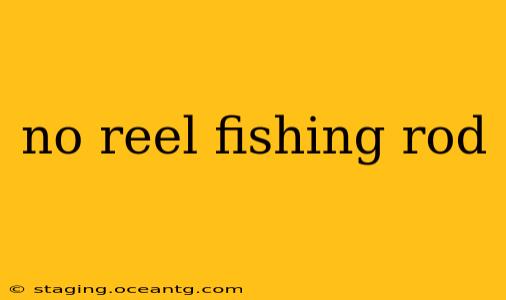Fishing without a reel might sound unusual, but "no reel fishing rods" represent a fascinating niche within the angling world. This method, often employing simple handlines or specialized rods, offers a unique connection to the fish and the environment, demanding skill and patience. This guide explores the nuances of fishing without a reel, covering various techniques and essential considerations.
What is No Reel Fishing?
No-reel fishing involves using a rod without a spinning or conventional reel. Instead, the line is directly attached to the rod tip, relying on hand-over-hand retrieval to set the hook, fight the fish, and bring it to shore. This ancient technique offers a more intimate and challenging fishing experience, highly rewarding for anglers seeking a closer connection to the sport.
Why Choose No Reel Fishing?
Several reasons draw anglers to this unique method:
- Simplicity: No-reel fishing requires minimal equipment, making it ideal for situations where portability is paramount or for beginners wanting a straightforward approach.
- Intimacy: The direct connection between angler and fish enhances the experience, offering greater feel and control during the fight.
- Traditional Approach: This method harkens back to traditional fishing methods, providing a historical connection to the sport.
- Cost-Effective: Eliminating the reel significantly reduces the initial investment, making it an accessible entry point for many.
Different Types of No-Reel Fishing Rods
While a simple stick and line can technically suffice, dedicated no-reel fishing rods are available, usually featuring:
- Strong, Flexible Tips: Designed to absorb the shock of a strike and facilitate hooking larger fish.
- Durable Construction: Built to withstand the stress of hand-over-hand retrieval and powerful fish.
- Appropriate Length: The length will depend on the target species and fishing environment.
Techniques for No-Reel Fishing
Successful no-reel fishing depends on mastering specific techniques:
- Casting: Accurate casting is crucial. Overhand or underhand techniques can be employed, depending on personal preference and fishing conditions.
- Setting the Hook: A firm, decisive strike is essential to secure the hook in the fish's mouth.
- Fighting the Fish: Hand-over-hand retrieval requires patience and strength, especially with larger specimens. Strategic maneuvering is key to tiring the fish and preventing line breakage.
- Landing the Fish: This often involves carefully guiding the fish towards shore, minimizing stress on the line.
What Kind of Fish Can You Catch Without a Reel?
The size and type of fish you can successfully catch without a reel largely depend on the rod's strength, line weight, and your skill. Smaller species like sunfish, perch, and trout are readily targeted. Larger fish are possible with heavier lines and stronger rods, but require significantly more strength and technique.
Is No-Reel Fishing Suitable for Beginners?
Yes, no-reel fishing can be an excellent introduction to angling for beginners. Its simplicity and lack of complex equipment can make it less daunting than learning with a reel. However, mastery requires practice and patience to develop the necessary skills for effective casting, hooking, and fighting fish.
What Line Should I Use for No-Reel Fishing?
The appropriate line depends on the target species and fishing conditions. Stronger, thicker lines are needed for larger fish and rougher environments, whereas lighter lines might suffice for smaller species in calmer waters. Monofilament is a common choice due to its strength and relative affordability.
Can I Use No-Reel Fishing for Ice Fishing?
While possible, ice fishing without a reel presents additional challenges. The confined space and potential for frozen lines demand extra caution and skill. It's generally recommended that beginners avoid ice fishing without a reel until they have gained significant experience.
This guide provides a foundational understanding of no-reel fishing. Remember that practicing different techniques and adapting to specific conditions are crucial for success. The unique rewards of this traditional method make it a rewarding pursuit for anglers seeking a more intimate and challenging fishing experience.
